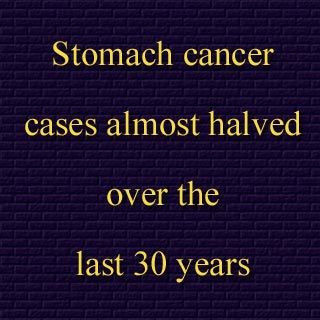
In addition, cases in women seemed to have decreased by more than half from about 5900 in 1975 to around 2650 in 2006. Furthermore, cases in men were noted to have decreased by nearly 50 percent, i.e. dropping from their peak of nearly 8300 cases in the year 1980 down to around 4800 cases in 2006.
However, recently, the number of cases seemed to have dropped as lifestyles have become healthier. Supposedly, diet, infection and smoking are the three chief risk factors for stomach cancer.
Dr Lesley Walker, Cancer Research UK director of cancer information, said that, “These figures illustrate that stomach cancer is largely preventable. Healthier living conditions, fewer infections, better diets and lower smoking rates mean fewer people are developing the disease. More cases can still be prevented.â€
A widespread stomach bacterium called Helicobacter pylori (H. pylori) is known to be the main cause of stomach cancer. Apparently, improved living conditions with less overcrowding has led to a decrease in H. pylori infection. The decrease in infection is considered to be a major reason for the decline in the cases of stomach cancer.
For the foremost time, researchers seemed to have revealed the connection between H. pylori and stomach cancer. This link was seen in studies performed in rural China in the year 1990 and in adult men in England and Wales in 1991.
Also, refrigeration appears to have a chief impact on reducing the cases of stomach cancer. This is happening due to storage of food in the fridge which keeps it cool thereby maintaining the freshness of food for a longer period of time. Further, fewer additives appear to be required in order to preserve food.
“It’s important that people know how to reduce their risk of the disease. Fruit and vegetables have a protective effect against stomach cancer and people with diets high in salt have an increased risk. A healthy diet high in fruit, veg and fibre, low in red and processed meat and salt helps reduce the risk of not just stomach cancer but many different cancers,†elucidates Walker.
Smoking was also believed to have doubled the risks of developing the disease. For instance, approximately one in five stomach cancers in Europe seemed to have been caused due to smoking. However, smoking rates appear to have also fallen down since the last 30 years. It was estimated that in the early 1970s around 50 percent of men and around 40 percent of women smoked whereas at present it is nearly 22 percent of men and 20 percent of women who smoke.
Stomach cancer is known to be the seventh most common cause of cancer death. Evidently, more than 5200 people die every year from this disease. It was observed that a poor diet low in fruit and vegetables and high in salt raises the chances of stomach cancer similar to a family history of the disease.
